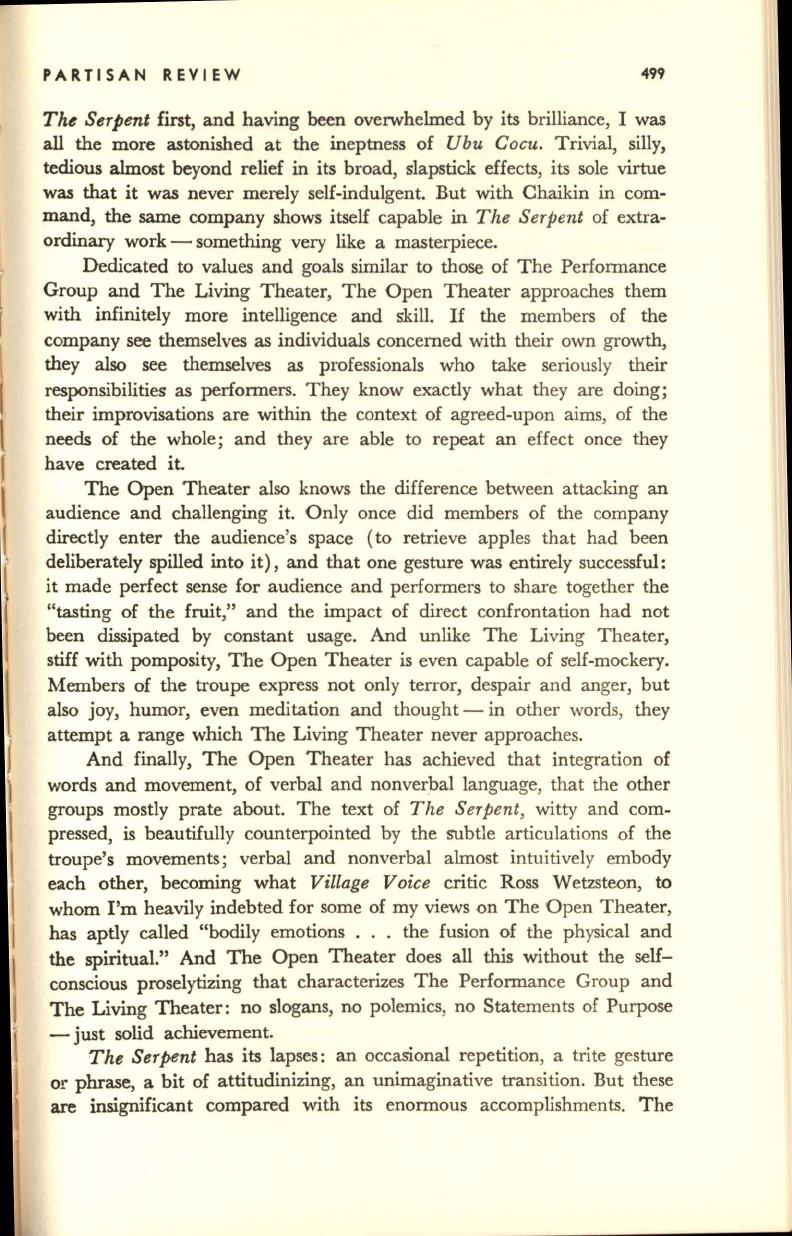
PARTISAN REVIEW
499
The Serpent
first, and having been ovelWhelmed by its brilliance, I was
all the more astonished at the ineptness of
Ubu Cocu.
Trivial, silly,
tedious almost beyond relief in its broad, slapstick effects, its sole virtue
was that it was never merely self-indulgent. But with Chaikin in com–
mand, the same company shows itself capable in
The Serpent
of extra–
ordinary work - something very like a masterpiece.
Dedicated to values and goals similar to those of The Performance
Group and The Living Theater, The Open Theater approaches them
with infinitely more intelligence and skill.
If
the members of the
company see themselves as individuals concerned with their own growth,
they also see themselves as professionals who take seriously their
responsibilities as performers. They know exactly what they are doing;
their improvisations are within the context of agreed-upon aims, of the
needs of the whole; and they are able to repeat an effect once they
have created
it.
The Open Theater also knows the difference between attacking an
audience and challenging it. Only once did members of the company
directly enter the audience's space (to retrieve apples that had been
deliberately spilled into it), and that one gesture was entirely successful:
it made perfect sense for audience and performers to share together the
"tasting of the fruit," and the impact of direct confrontation had not
been dissipated by constant usage. And unlike The Living Theater,
stiff with pomposity, The Open Theater is even capable of self-mockery.
Members of the troupe express not only terror, despair and anger, but
also joy, humor, even meditation and thought - in other words, they
attempt a range which The Living Theater never approaches.
And finally, The Open Theater has achieved that integration of
words and movement, of verbal and nonverbal language, that the other
groups mostly prate about. The text of
The Serpent,
witty and com–
pressed,
is
beautifully counterpointed by the subtle articulations of the
troupe's movements; verbal and nonverbal almost intuitively embody
each other, becoming what
Village Voice
critic Ross Wetzsteon, to
whom I'm heavily indebted for some of my views on The Open Theater,
has aptly called "bodily emotions . . . the fusion of the physical and
the spiritual." And The Open Theater does all this without the self–
conscious proselytizing that characterizes The Performance Group and
The Living Theater: no slogans, no polemics, no Statements of Purpose
- just solid achievement.
The Serpent
has its lapses: an occasional repetition, a trite gesture
or phrase, a bit of attitudinizing, an unimaginative transition. But these
are insignificant compared with its enormous accomplishments. The


